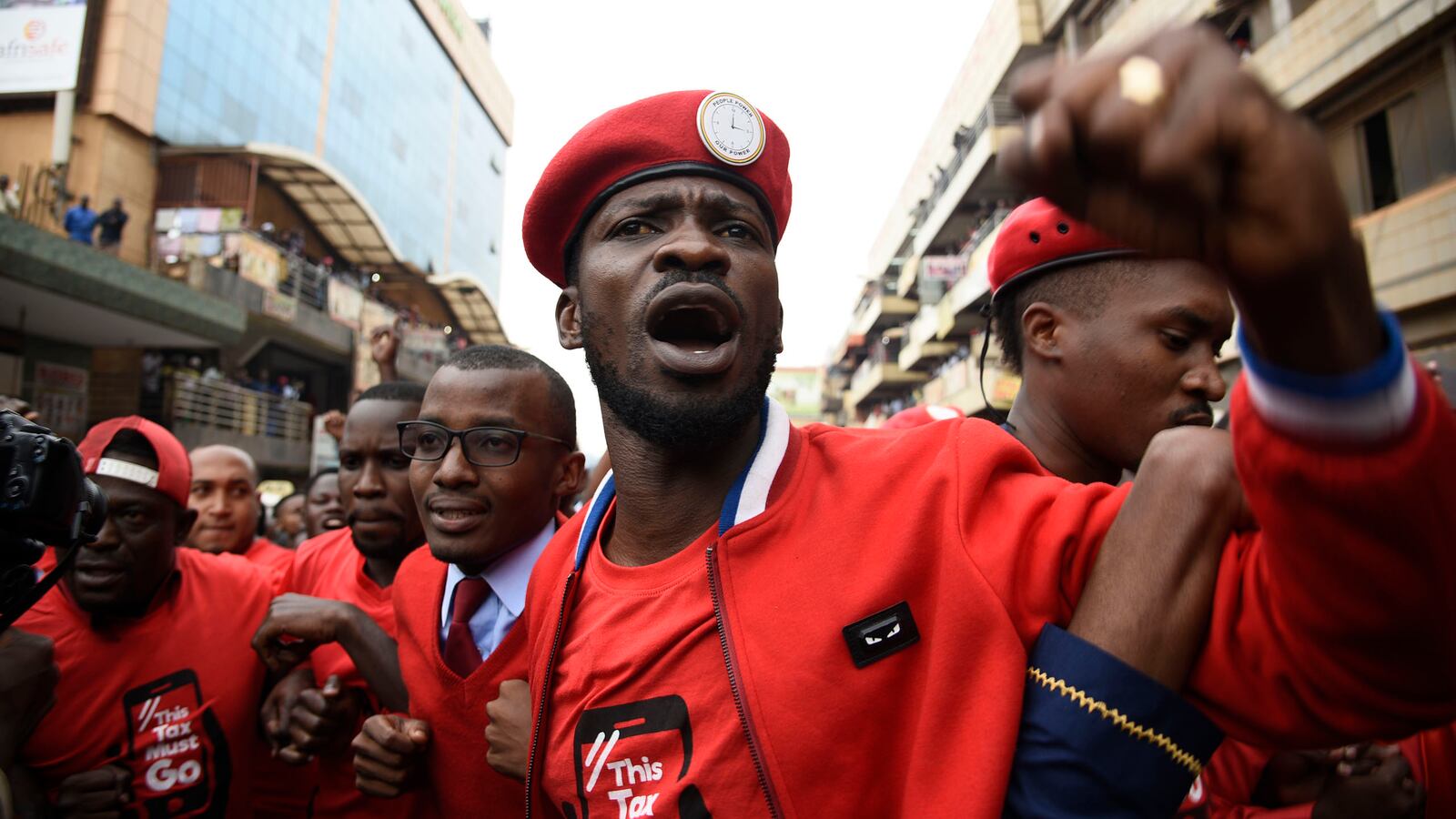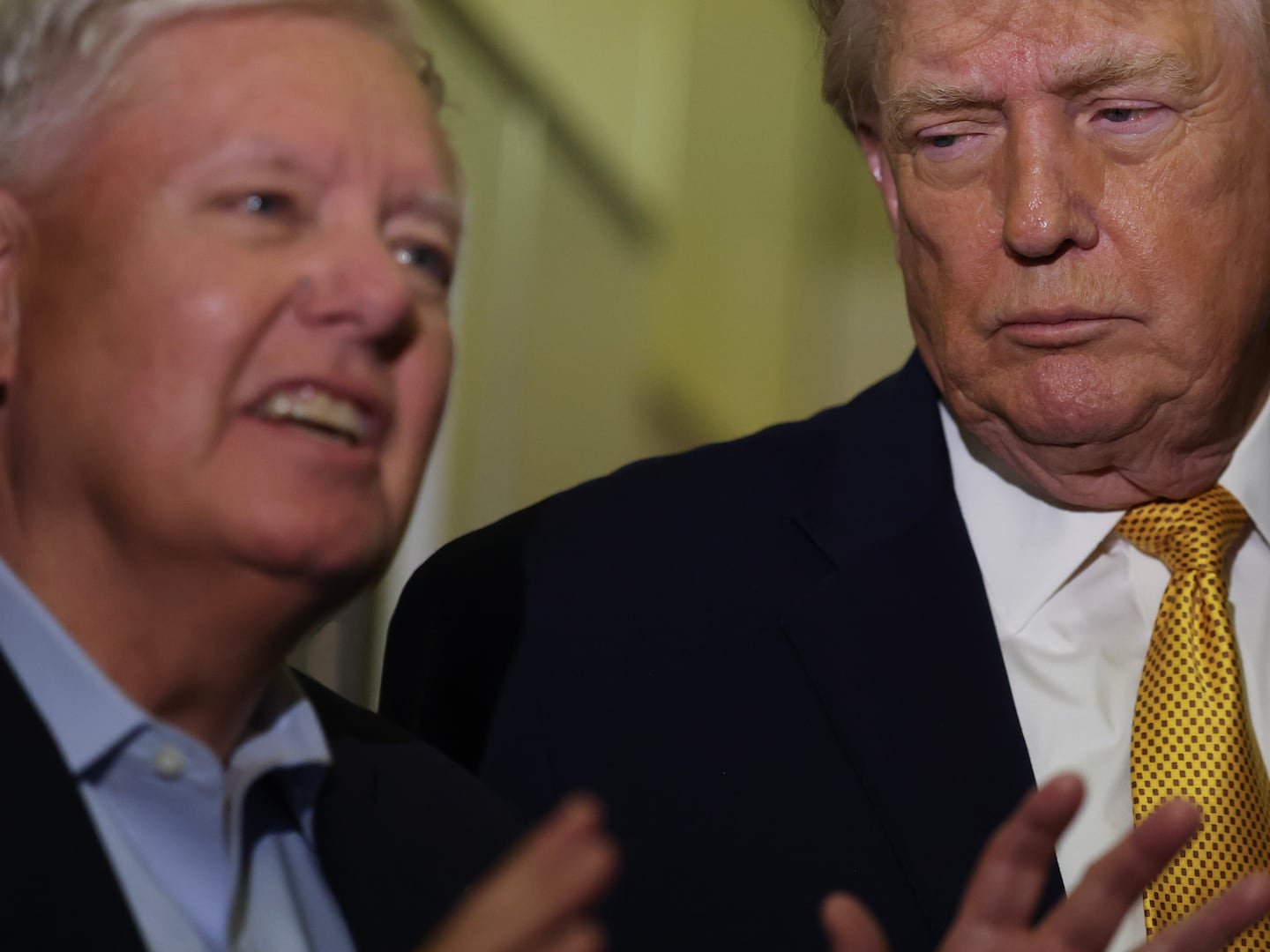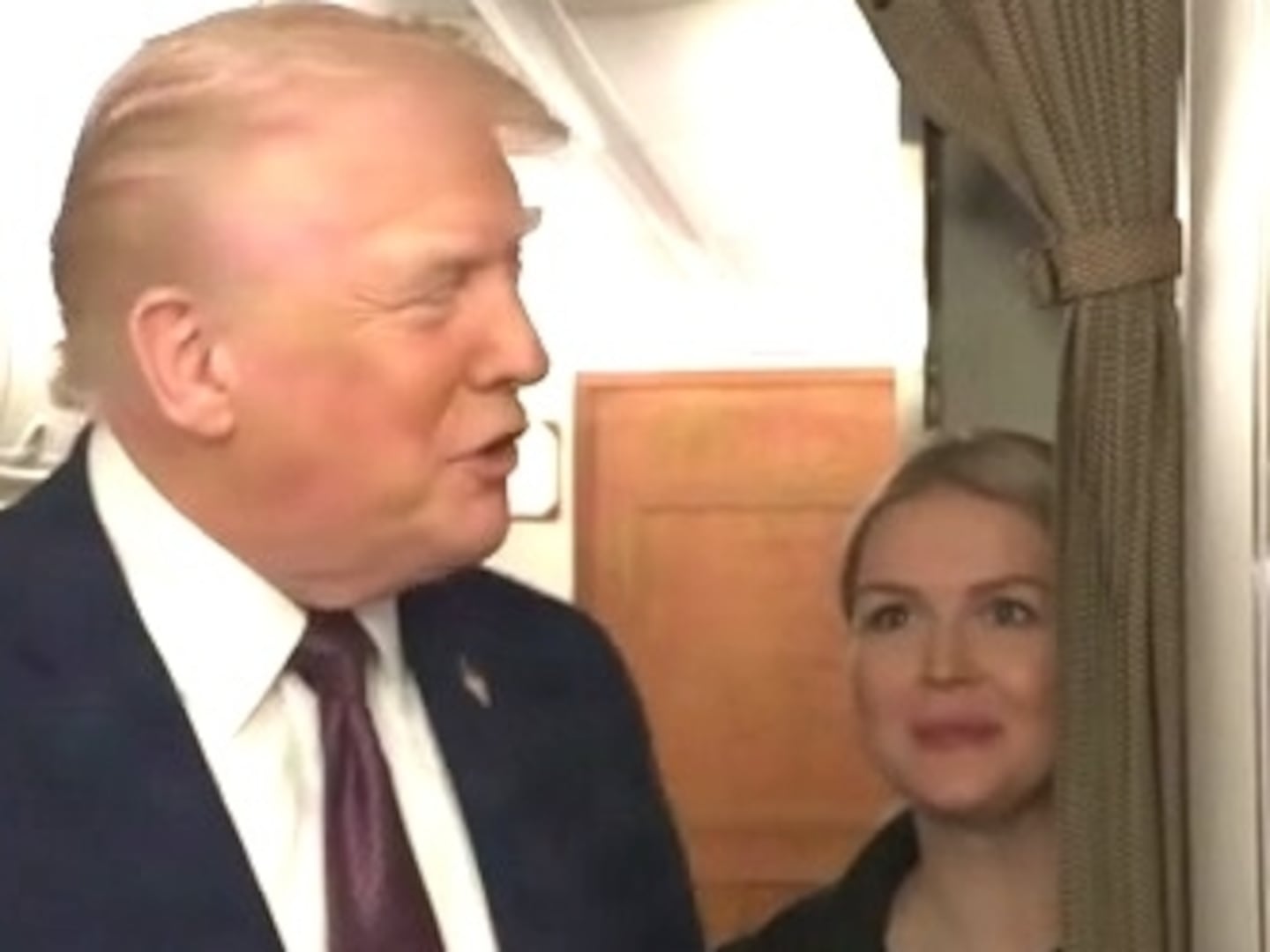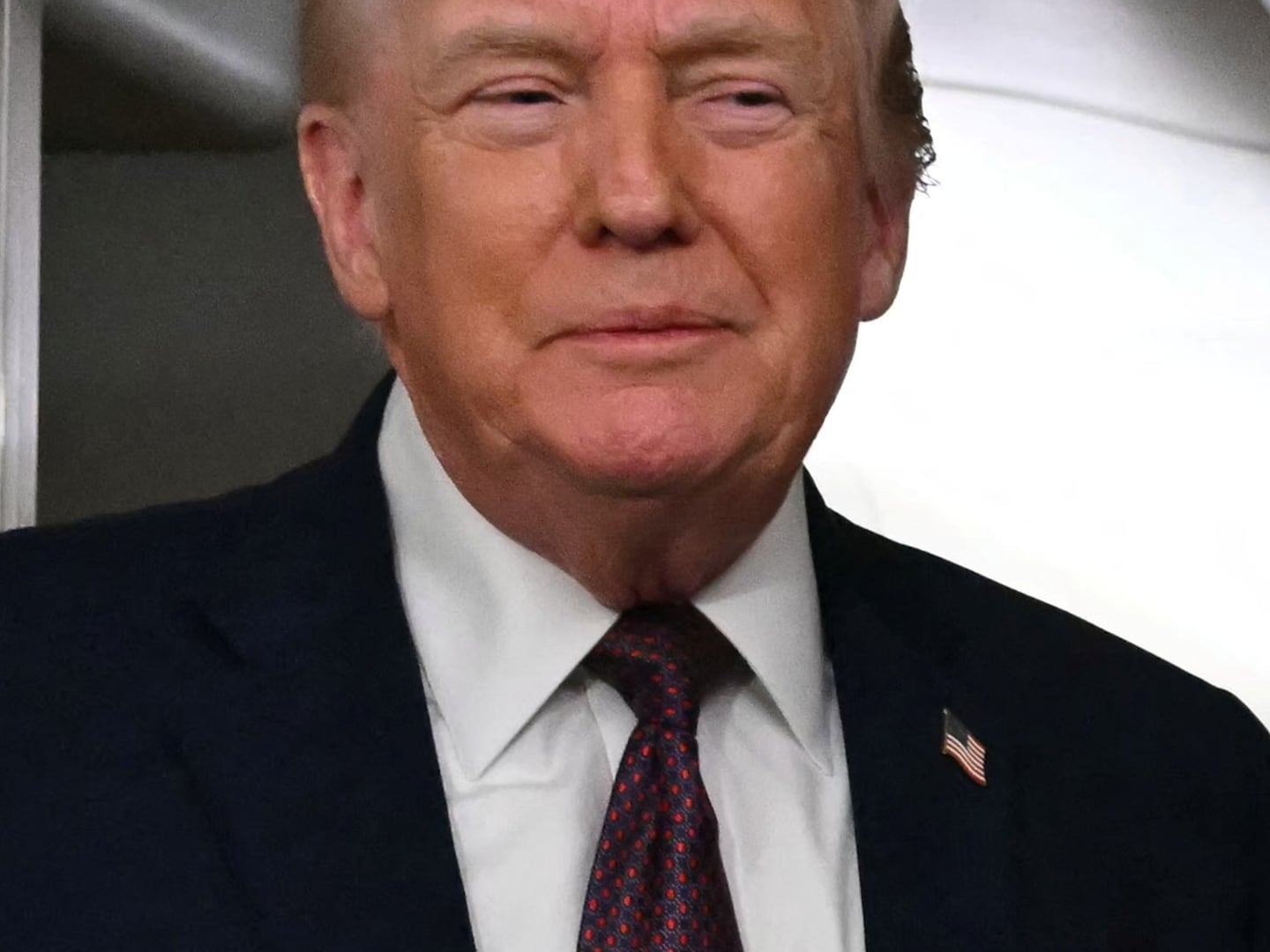It’s 8 in the morning in Kamwookya, a slum in northeast Kampala, the capital of Uganda. A young man wakes on a lumpy mattress on the floor of a house built from spare cement. With some difficulty he tunes in the news on a transistor radio and listens with a mix of concern and disgust. He shakes his head, walks out the front door, raises a megaphone to the sky and sings out, backed by a powerful Afro beat:
Freedom comes to those who fight
And not to those who cry,
But the more you cry,
The more your people continue to die.
So rise! Defend your rights.
In this music 2014 video, “Time Bomb,” the performer-turned-politician Bobi Wine walks through narrow alleys singing in local dialect, “I don’t know why de corruption is too much,” as drone shots lovingly scan the neighborhoods tin roofs and outdoor markets. These are the people. These are his people.
Bobi Wine is a singer and a politician whose lyrics and talking points focus on staggering corruption, soaring unemployment, gross inequality and the dire state of social services in his country, Uganda.
Wine may be little known in the United States, but across Africa he represents a new generation of progressive leaders, and when he was arrested in mid-August, demonstrations spread online and in the streets in boundary-crossing solidarity.
“These are young countries for long held onto by dictators,” says Rosebell Kagumire, a blogger and activist based in Kampala. “Our future is connected. It is not about borders.”
Wine put it simply in a phone interview with The Daily Beast, “The rest of Africa stood with us because our situation is not unique to us.”
Wine’s message is straightforward: people deserve the agency to shape their futures. “If we want to change our lives, than we need to change the leadership.”
With the given name, Robert Kyagulanyi Ssentamu, at the 36-year-old Wine serves as a member of the Ugandan parliament. But he says he never expected to become a politician. His mind changed about 10 years ago when a man he describes as a “military operative” attacked him at a nightclub. Wine believes he was targeted just because he was in an expensive car, and though it could have been a trivial incident, for him it epitomized the regime’s growing abuse of power. “That was a turning point,” he recalls. “I decided I would not condone injustice.”
The president of Uganda, Yoweri Museveni, one of Africa’s longest-ruling dictators, in power since 1986. In his early years in office, he was favored by many Western nations for running a relatively liberal government in a country that had suffered under the infamous tyrant Idi Amin. But as Museveni ages, he has been tightening his grip. Last year he removed the presidential age limit from the constitution, opening the way for him to be president for life.
Wine has emerged as a leading challenger. First in his songs, then in his stump speeches, he has been one of Museveni’s most outspoken critics and represents one of the keenest threats to his more-than-three-decade rule.
“Museveni is already defeated as a person,” Wine told The Daily Beast. “He has nothing new. He has always thrived on division among tribes... social status. He has never seen Ugandans so united, so determined to speak with one voice, and that is exactly what is happening."
On August 13, Wine was arrested and his 40-year-old driver shot and killed, allegedly by security forces, while campaigning for a fellow opposition politician in the northwest town of Arua. Wine, along with three other legislators and 31 other people, was charged with illegal possession of firearms and ammunition, and for allegedly throwing stones at the motorcade of President Museveni, who was in Arua as well.
The government did not respond kindly to the outraged protests that followed. More than 100 people were arrested, journalists assaulted and at least three people were killed as the army and police patrolled the pothole-ridden streets in armored cars, on foot with AK-47’s and, at least according to some distressed Kampala residents, in plain clothes as spies. Shops were closed, schools and businesses shuttered, and after a few days of demonstrations, the United States and the United Kingdom issued a warning against travel to Uganda.
The tension across the country was palpable for two weeks, until Wine, evidently suffering from physical injuries, limped into a courtroom hearing. The initial charges were dropped, but Wine was re-arrested immediately on charges of treason. He subsequently was released on bail.
Since earlier this month, Wine has been in the United States getting medical treatment for the traumas he incurred in detention, and it’s reasonable to assume that Museveni hoped Wine would remain in exile, but he says that on Tuesday he’s going back home. On October 1, his trial begins. If found guilty of treason he could face the death penalty.
The court proceedings, while dangerous for Wine, are dangerous for Museveni as well. The protests that followed Wine’s arrest were a response to the imprisonment of a political hero. The trial and the threat of execution are only like to make demonstrations bigger, fueled as they are by the energy of some of the youngest populations on the planet.
Seventy-six percent of Uganda’s population is under 30, and 80 percent of Kenya's population is under 35. In Tanzania, the median age is 18. In all three countries the youth unemployment rate is above 60 percent. Overall, the World Economic Forum reports that the world’s 10 youngest populations are in Africa, and the United Nations has calculated that the median age of the continent’s population is 19.5.
Dennis Owino, a Kenyan analyst, says the protests have awakened “the sleeping giant” and that is the youth. “As you’ve noticed, the fire is beyond Uganda. Everyone is fired up."
Wine will be depending on that fire in coming weeks. Wine told The Daily Beast his trial is “politically motivated” in a country where “there is no independent judiciary,” but he is also betting that pressure from the international community, which spoke out sharply against his arrest, will keep him alive.
When asked if he ever thought about trying to stay in the States, Wine dismissed the notion. “I never thought of staying away from my home,” he told The Daily Beast. “I was born in Uganda, I have a young family in Uganda. Everything that I own and everything that I am is Ugandan.”
Even though few rulers on the continent have had longevity comparable to Museveni, many of these leaders fall into the post-colonial power dynamics, behaving as if their personal rule is indispensable, and benefitting from the inevitable corruption. For now at least, charismatic younger politicians like Wine are unsullied and offer something new.
“Older politicians had a bit of access which they have hogged for decades,” says Nerima Wako-Ojiwa, the executive director of Siasa Place in Kenya, a “political hub” for women and young people, told the Daily Beast. “Due to their wealth and power it makes it difficult for younger politicians to thrive.”
This is why across East Africa, and, to a lesser extent, in parts of central, west and southern Africa, as well as the diaspora in the U.S., Canada, Japan and Norway, among other countries, virtual and then physical boots hit the ground in solidarity when Wine was arrested.
Fueled by social media, the pace of the disruption of the political geography in Africa is accelerating. Never before has the continent stood in solidarity with Uganda in this way, Jimmy Spire Ssentongo, an Associate Dean at Uganda Martyrs University told The Daily Beast.
“The colonialists made the countries,” said Claude Gatebuke, a survivor of the genocide in Rwanda who now does Africa-focused human rights work from the United States. Gatebuke sees his home country as a “small piece of the puzzle” in the jigsawed interlocking interests and corruption that characterize the continent. The older dictatorial leaders all nod to each other, repression in one country allows it to be perpetuated in another.
In Rwanda and Tanzania, where extremely restrictive political environments prohibit protests, citizens spoke out on social media, changing their avatars to pictures of Wine after he was detained, making statements about the arrests and attacks on younger politicians in their own countries.
Rwandans reignited a plea to #FreeDianeRwigara, a woman who ran against Rwandan President Paul Kagame and ended up in jail soon after she launched her campaign last August. Kagame went on to win the vote by 99 percent.
“If you shouted #FreeBobiWine is time you do the same for #FreeDianeRwigara,” tweeted Abraham Mutai, a social justice activist who is originally from Kenya but identifies as African. As he put it in a later conversation with The Daily Beast, “I think I Am African first, then Kenyan. Kenya is a colonial border. African is who we are. Who we were born.” Mutai is coordinating with colleagues in other countries to support demonstrations for political prisoners in South Sudan, Rwanda and Tanzania.
“Since we can’t speak out on our own atrocities I feel like we are using Bobi Wine to tell the rest of the world just how wrong things are here,” Carol Ndosi, a Tanzanian activist, said in an interview with The Daily Beast. Since the election of Tanzania’s President John Magufuli three years ago, speaking out against the political leadership has become an increasingly dangerous endeavor.
Tundu Lissu, a prominent Tanzanian opposition politician has had to have 19 surgeries since he was shot more than 30 times in an assassination attempt last year.
Tanzania also has a stringent social media law that regulates content online and forces activists and influencers to pay a $930 fee if they want to keep their sites running.
Burundi has become increasingly oppressive since failed protests in 2015 sparked a government strangle-hold on power to the point that citizens in the country would even avoid online engagement. But Burundians who live outside the country like Judicaelle Irakoze have jumped into the fray. “The situation in Uganda really triggered a lot of Burundians,” she said.
In an email, an analyst from Equatorial Guinea, a tiny country on the west coast of Africa where about 60 percent of the country is under 25, Tutu Alicante, said “We cannot promote democracy and respect for human rights in our countries, and not pay attention to regional and continent-wide problems. If Museveni and Obiang (President of Equatorial Guinea), two good friends, are constantly comparing notes, those of us fighting to end impunity in Uganda and Equatorial Guinea either support each other or fail on our own.”
While Alicante is keeping an eye on Uganda’s politics, and is himself participating on social media, he says there won’t be any similar action in his home country anytime soon. Low internet penetration combined with state-run media keeps the larger population unaware of international events.
The former manager for one of Nigeria’s most legendary musicians, Fela Kuti, started a petition calling for Wine’s release. In an interview with the BBC, Rikki Stein, Kuti’s manager said, “It's like a re-run of Fela. He was often beaten for speaking out.”
For his part, Wine says he feels “particularly Ugandan, but generally African.” Uganda, says Wine, has its own narrative as a nation, one in which he is now playing a principal role.
In Wine’s “Time Bomb” video, at one point he looks directly at the camera:
My people must realize
De most important ting
Say, true liberty begins inna your mindset
To free ghetto people dem must educate
But education, expensive to get
Is like you say we carry water inna busket.
Later, he wears a t-shirt that says “We Are The 99 %.” Judges, school kids, soldiers, doctors with stethoscopes hanging around their necks join the crowd, now out of the alleys and walking under the expanse of the sky in the open road. In between the scenes of the people marching and Wine singing, there are shots of run-down, over-crowded medical clinics and of car wheels stuck in muddy streets.
The video ends with Wine swinging through the barriers of what looks like a very official government office building. Is he about to take over?
Other young politicians, like John Wasikye, told The Daily Beast it’s up to Wine to set the tone for what happens next, warning that he could turn out to be little more than a “political entertainer.” Still Wasikye says, “He gives the whole thing new meaning, courage and power … the young people who are about 78 percent of the Ugandan population feel that it’s actually possible with just a little determination. The time is ripe for change.”





